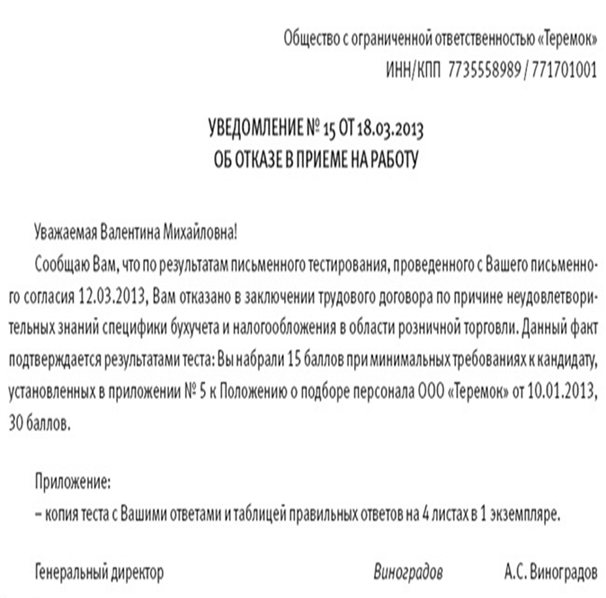When should an applicant expect a response or refusal?
You should count on rejection if you've spent time on the interview.
It doesn't matter whether it was a Skype interview or you met in person, spending time, gas and money to get to where the employer or recruiter decided to look at you.
Even if the employer preferred other candidates, basic politeness requires thanking the person who took the time to participate in the competition for the time spent traveling and/or interviewing.
It is logical to expect an answer in this case.
If your participation in the competition for a vacant position was limited to three mouse clicks when sending your resume, then it’s hardly worth reproaching the employer for the lack of a negative response.
Although there are many other reasons why an applicant who has applied for a vacancy does not receive an invitation to an interview or a refusal on his resume.
We refuse correctly
Written message
The refusal letter must be submitted to the employee who supervises the position, to the secretariat or personnel department.
A written refusal gives a chance to avoid a personal meeting with the failed employer, but requires compliance with the norms of business correspondence and implies a statement of the reasons for the decision.
This method is used by people who have difficulties with verbal communication, as well as applicants from other regions. You can choose a written form of refusal if you also received an invitation to an interview in writing. A well-designed letter includes several points that will characterize you as a diplomatic and confident player in the labor market, while simultaneously reducing the negative effect:
- A greeting, an address (preferably personal), gratitude for attention to your candidacy and appreciation for productive/pleasant communication.
- Regret and refusal.
- Arguments.
- We wish you success in finding a replacement and successful business.
- A polite farewell.
Undesirable information (refusal) is contained in a “cover” of good messages. This technique of refusal is called the “sandwich strategy” and has been successfully used in politics and business. It is also adopted by recruiters who use this technique to notify applicants of refusals.
Sample letters
“Dear X!
Thank you for your interest in my candidacy. I am forced to inform you that I have already found a more suitable vacancy in another company, and therefore I am withdrawing my candidacy from a position in your organization. I wish you success in finding a worthy employee.
Sincerely,
YY."
Telephone message
Allows you to save time, limit emotional contact that is inevitable during a personal meeting, and at the same time demonstrate loyalty to your partner.
Telephone communication is preferable to letter if the interaction has reached the stage of a follow-up interview, meeting with the immediate supervisor or agreement to work. The algorithm for conducting a conversation in this case is similar to the scheme for composing a written message and includes the same points:
- greetings;
- outgoing call contact reminder;
- regret and refusal;
- statement of reasons;
- wishes of success and farewell.
The complexity of telephone refusal lies in the simultaneously two-way nature of communication. The interlocutor gets the opportunity to challenge the statement, express dissatisfaction, or offer alternative solutions. If the purpose of the call is a decisive refusal, and not a search for a compromise, you should be guided by the following rules:
- Come up with clear reasons for refusal in advance. Find an irrefutable excuse that will hide the real reason.
- Tactfully but firmly adhere to the chosen goal, do not allow the opponent to involve you in the discussion, avoid an apologetic tone and reject counter-offers.
- Regardless of the emotional coloring of the conversation, end the conversation favorably, using the final point of the scheme.
How to sell a pen at an interview
Example conversation
“Hello, XX! This is YY. We met about my employment for the position…. Thank you for making a positive decision on my candidacy, but I must inform you that I have found a more suitable vacancy in another company, so I am forced to refuse your offer. I wish you success in your search for an employee."

A personal meeting
This method of voicing a decision on refusal is advisable to use by applicants for senior management positions, specialists of a narrow profile, as well as those who use the method of personal recommendations when searching for a job.
A personal visit to the employer is justified in a situation where confirmation of a position was preceded by a lengthy selection process, multi-stage work with the applicant, negotiations with managers, etc. A visit to the employer is also relevant if the applicant allows for a compromise. This is an expectedly costly and emotionally stressful technique for communicating negative news, but with prudent organization it can become a profitable investment in your professional future and maintain effective connections. The principle of conducting a conversation with a failed employer is based on a written or telephone refusal, but involves longer communication, expanded potential for discussion, the likelihood of vigorous protest and unforeseen variations in the conversation at the initiative of the opponent. The message formula for a personal meeting includes the following components according to the already familiar “sandwich” system:
- expressing gratitude for the time spent (the stage of the listener’s psychological preparation for unfavorable information);
- refusal (may cause an emotional reaction);
- communicating the reasons (in the case of a one-on-one conversation with a representative of the employer, this item is often the subject of lengthy discussions);
- wishes of success and expression of hope for future cooperation; Repeatedly expressing gratitude for the communication.
Why applicants are not rejected based on their resume?
Firstly, the recruiter spends only 10 seconds on the initial review of the resume.
It is unlikely that he will be ready to spend the same amount of time sending a “rejection” message.
Secondly, sometimes you can understand whether an applicant is interesting or not immediately, but only after all the responses have been reviewed - everything is known by comparison.
Thirdly, the formal compliance of the applicant with the stated requirements makes the refusal unfounded.
Fourthly, sometimes the resume sent as a response does not meet the employer’s requirements so much that the refusal becomes meaningless.
Template refusals
When there is a large flow of applicants, companies send out template notifications. Here are some examples:
- “You are suitable for this vacancy according to most criteria. But besides you, there were several other candidates. One of them had more professional skills than the rest, including you. Accordingly, we refuse to provide the position.”
- “Based on the results of the interview, your candidacy was rejected.”
- “For this position, professional knowledge of a foreign language is required. Since your level is low, we are forced to refuse you.”

After negotiations, it is worth remembering that the candidate must be notified of the results:
- It would be better to send a standard template response than to completely ignore it;
- It is recommended to send the decision made immediately so as not to forget;
- when making a decision during an interview, you should familiarize the candidate immediately or ask to call back in a couple of days;
- if the flow of applicants is huge and there is absolutely not enough time for mailing and calling, then you should be warned that if no notification is received within a week, the result can be considered negative. This way, time is saved, and the potential employee will not hopelessly expect a positive result;
- If, during personal presence and the announcement of a negative result, the applicant suddenly flared up and began to behave aggressively, then you should end the conversation and ask him to leave.
Why is an applicant rejected on a resume?
If the applicant does not meet the requirements stated in the job description, the answer is obvious - the recruiter took the time to refuse.
If the rejected applicant meets the requirements stated in the job description, then there is no use in guessing.
There can be an unlimited number of reasons - from the applicant’s failure to meet the requirements not stated in the job description, as here, to careless handling of the “refuse” button.
The last version seems very plausible after someone is sent a refusal in response to an application, and then invited to an interview after finding a resume in the database of the same site.
Rules for conducting a conversation to refuse a vacancy
The fundamental laws of interpersonal communication and diplomatic scripts (schemes) also apply in the context of a personal meeting with an unsuitable employer. The conversation is not difficult if the applicant remembers that he is an equal participant in the labor exchange, offering his professional services in exchange for the agreed remuneration. Following this idea, it will not be difficult for the initiator of negotiations to protect his interests without going beyond a friendly tone. It is worth making a plan for the conversation in advance, providing an explanation with one or more arguments and sticking to the chosen goal - unconditionally sever the relationship or win more friendly terms. Here are a few rules to help you achieve success in negotiations:
- Brevity. The message should be concise and succinct to save time on both sides.
- Avoid an apologetic tone. Despite the natural desire to smooth out the negative message of the news and reduce tension, you should adhere to a parity style of communication in order to keep your interlocutor from making unconstructive statements. Eliminate the words “sorry”, “excuse me”, “I beg your pardon”.
- It is advisable to use a clear non-verbal “mask” that will help the opponent’s subconscious perceive the speaker as an honest and decisive person: eye contact, a friendly smile, open hand gestures.
- If the interlocutor takes the conversation to an emotional level or continues to insist on unacceptable conditions, you should use the “dumb refusal” technique (repeating the chosen decision for each opponent’s remark).
- Avoid emotional reactions to irritation and reproaches; be patient.
Example
“Hello, XX! (Remind yourself if required) I am very glad that you took the time to communicate with me. It was useful for me to communicate with professionals; I learned a lot of new and useful things. It would be nice to work here, but I realized that I would not be able to reach my full potential due to... . This decision was not easy for me; I thought for a long time before deciding to do it. I wish you to find a suitable employee as soon as possible. Thank you again. Here are my contacts for the future, I will be glad to meet you again someday.”
5 Steps to a Successful STAR Interview
Method 8 - refusal during the interview.
Sometimes, when during the interview it turns out that the experience, knowledge and skills of the applicant obviously do not meet the requirements specified in the job description, you should immediately say so.
“The specified requirements are mandatory, so we are unlikely to be able to make you an offer. I’m very sorry that you wasted your time...”
If the reason for the refusal is not obvious, then it is better to refrain from refusing.
There are many ways to refuse, but in most cases employers do not bother to use them.
Let's try to figure out why.
How to refuse a candidate without getting upset yourself

But it is better to send a template response than to send nothing at all. We have collected everything that will help you write a refusal letter and send it to the candidate on time
Things to remember:
1. It is better to send a template answer than not to answer anything. 63% of job seekers have a negative attitude towards . 2. Answer as soon as you make a decision - this way you will definitely not forget about it. You don’t have to remember everything, gather your strength, call back. 3. If during the interview you realized that the candidate is definitely not suitable for you, you can make your fate easier: ask the candidate to call back in a couple of days and find out the result. This way the task will not be forgotten and will not hang like a heavy burden. 4. During mass selection, it is quite acceptable to warn applicants directly during the interview: “If we haven’t called you back in two days, it means we chose someone else. Sorry that we won’t inform you personally - we have a very large flow of applicants for this vacancy.” It is better to warn than to remain silent. 5. If a person passed the interview in several stages, send him a detailed answer. Make your job easier: ask the manager who took part in the interview to justify the refusal. 6. Don’t get personal, even if the person starts swearing. Are you company representative. After you have given the reason for the refusal, simply end the conversation with the rude person.
How to refuse under the Labor Code of the Republic of Kazakhstan In accordance with clause 1 of Art. 23 of the Labor Code of the Republic of Kazakhstan, is his right to freedom of choice when hiring. 1. In this regard, the employer has the right to decide independently whether to hire this employee or not. 2.At the same time, in accordance with the requirements of Art. 25 of the Labor Code of the Republic of Kazakhstan, it is prohibited to violate equality of rights and opportunities when concluding an employment contract. 3. Pregnancy, the presence of children under three years of age, minority, disability cannot limit the right to conclude an employment contract, except for the cases provided for by this Code. At the request of the category of persons specified in paragraph one of this paragraph, the employer is obliged to provide the reason for the refusal in writing. At the same time, according to Article 26 of the Labor Code of the Republic of Kazakhstan, it is not allowed to conclude an employment contract to perform work that is contraindicated for a person for health reasons on the basis of a medical report. If, after refusal, the applicant wrote a letter asking him to justify this decision, you are required to do so by law. If the applicant is not satisfied with the answer, he can go to court. Therefore, in the text of the vacancy it is necessary to indicate the clearest requirements possible, and in a written refusal to indicate a specific reason.
The conclusion from the requirements of the Labor Code of the Republic of Kazakhstan is simple: the best short reasons for refusal are “We hired a candidate with extensive experience” or “We hired a candidate with specialized education.”
Letter or call?
It’s more pleasant to share good news over the phone. But it’s better to refuse by letter.
Firstly, it is easier for the candidate to cope with emotions. He will calmly consider the refusal and, perhaps, send clarifying questions that did not come to mind during a minute of conversation.
Secondly, you will not tear a person out of the work process: he will open the letter exactly when he realizes that he is ready to do so.
An easy way to respond to everyone at once is to send template emails. In the employer’s personal account on hh.ru, you can send out refusals with one click, without going to your resume, and change the response template for each new vacancy.
How to write a refusal letter
The refusal pattern does not have to be “boilerplate”. The secret to good writing is personal touch. Imagine that the letter should be received by your friend, and not by a conventional person in a jacket. 1. Give thanks. As dryly as possible: not just “Thank you for responding to the vacancy,” but at least “Thank you for choosing our company over hundreds of others.” 2. Justify the refusal. Instead of “Unfortunately, we are not ready to make you this offer at this time,” create a personalized response for the vacancy. For example: “Unfortunately, at the moment your experience does not suit us. We are looking for a candidate who has worked for our competitors for at least three years and knows the market.” 3. Don't burn bridges. “We hope you don’t mind if we save your response and contact you if we have other suggestions.” 4. Encourage the candidate. If the candidate was interviewed, add a few truthful words about his good qualities: “The project manager was impressed by your commitment to learning. We are confident that after a year of practice you will be able to apply for a manager’s position.” 5. Leave your signature. Be a human to the candidate, not a robot mailer.
Just do it!
The worst refusal option: tell the candidate: “We will call you back!” - and not call back. Nobody wants to do this, and everyone has more important and interesting tasks. But it is important to refuse for three reasons: • refusals are one of the components of the company’s image in the HR market; • this is your image as a recruiter; • Finally, it's just your job. Include refusals in the job description, tell the manager that every Friday you will be busy answering candidates for two hours. Help others grow: A really good rejection tells a person what to work on and motivates them to continue to grow. The number of people of working age is not unlimited, and if he acquires the missing skills, in a couple of years he will become a desirable candidate. Therefore, unless you are conducting mass recruitment for vacancies, recommend trainings, courses, and professional literature in case of refusals. Let candidates return to you!
Why applicants are not rejected
Reason 1. Not accepted
This can mean anything, including the fact that, according to established practice, no one believes in the veracity of the phrase “We will contact you (even if the result is negative)” - neither those who pronounce it, nor those to whom it is spoken .
Most employers don't even consider turning down applicants, so those who do raise eyebrows.
Although, of course, a positive attitude and respect for such a rare employer are also guaranteed.
Reason 2. There is no time and/or the company allows not to refuse applicants if there is another job
A recruiter can be seriously overloaded, and management evaluates the quality of work by the number of employees hired, and not by the number of refusals sent.
Therefore, refusals to applicants, as a rule, are in last place on the list of priority tasks.
Maybe the company's management thinks that refusals have a positive impact on the employer's image, but they are unlikely to require the recruiter to do this work and calculate the labor costs for this work.
Reason 3. It is impossible to explain the reason for the refusal
The “like” criterion will always be the main one when choosing an employee.
Sometimes selection specialists prefer not to answer the applicant, avoiding the question “Why was I rejected?”
Reason 4. “I’d like to see someone else” or lengthy consideration of candidates for a vacant position
It happens that the employer is not ready to make an offer to the applicant, but he is also not ready to refuse - in case he can’t find anyone better.
The state of uncertainty drags on for such a long period of time that a refusal in a month and a half will look strange.
Therefore, no one thinks about refusal anymore.
Reason 5. It is not known who should refuse
The recruiters sent the applicant to the client, who then makes the decision himself.
Given that one party wants to receive money for the order, and the other wants to receive the final candidate for money, such insignificant details as who, how and when will respond to rejected applicants are almost never discussed.
The employer believes that he paid money for the final candidate, and the rest does not concern him; the recruiter does not go into details of the decision.
Reason 6 Waiting for the candidate to whom the offer was made to start working.
The situation when an applicant who has received and accepted an offer never appears with a new employer is not uncommon.
An employer who has not received a new employee, but has rejected the “spare” participants in the competition, is forced to start the search from scratch.
Therefore, to be on the safe side, the refusal to applicants may be delayed, and then they may simply forget about it.
The list of reasons is not exhaustive... anything can happen.
When an employer has no right to refuse candidates
So, on what grounds can you not refuse?
Let's start with the fact that any requirement for candidates specified in the vacancy must be truly necessary to perform the job. You can indicate certain business qualities determined by the specifics of the job. Candidates who do not have the business qualities necessary for this job can be safely rejected.
Examples of business qualities can be seen, in particular, in the Qualification Directory of Positions of Managers, Specialists and Other Employees, approved by Resolution of the Ministry of Labor of Russia dated 08/21/1998 No. 37 or in the Unified Tariff and Qualification Directory of Work and Professions of Workers (ETKS).
A requirement that is not related to business qualities (for example, that a candidate is needed of a certain gender, age, nationality, appearance, etc.) may be regarded as discrimination. And refusal on this basis too.
No one can be limited in labor rights and freedoms or receive any advantages depending on gender, race, skin color, nationality, language, origin, property, family, social and official status, age, place of residence, attitude to religion, beliefs, belonging or non-belonging to public associations or any social groups, as well as other circumstances not related to the employee’s business qualities (paragraph 2 of article 3 of the Labor Code of the Russian Federation).
The business qualities of an employee should, in particular, be understood as the ability of an individual to perform a certain job function, taking into account the professional qualifications he has (for example, the presence of a certain profession, specialty, qualifications), the personal qualities of the employee (for example, health status, the presence of a certain level of education, work experience in a given specialty, in a given industry).
In addition, the employer has the right to present to a person applying for a vacant position or work other requirements that are mandatory for concluding an employment contract by virtue of a direct prescription of federal law, or that are necessary in addition to standard or typical professional qualification requirements due to the specifics of a particular or other work (for example, knowledge of one or more foreign languages, ability to work on a computer).
A candidate’s lack of certain experience is a justified reason for refusal; this is also confirmed by judicial practice. For example, the vacancy states the requirement ㅡ 3-5 years of work experience, but the candidate believes that this is unreasonable, and in fact, he, with one year of experience, is also suitable. There was such an example in judicial practice, and the court sided with the employer.
The law also prohibits discrimination on the basis of property, because the employer is obliged to provide employees with everything they need to complete their work tasks (if, of course, we are talking about labor relations).
You cannot refuse to hire, for example, a driver because he does not have his own car, or a furniture assembler because he does not have his own tools.
But having a certain experience, education, qualificationsㅡ these are the business qualities necessary to effectively perform the job. Their absence is grounds for refusal.
| You can refuse due to absence | You cannot refuse on the grounds |
| A certain profession, specialty, qualification | Gender, age, appearance, skin color |
| Certain experience | Place of residence (including the presence or absence of registration in a particular city) |
| Certain education | Lack of certain property (car, tools, equipment) |
| Computer skills (if the position requires it) and other skills necessary to perform work tasks | Presence or absence of children |
| Proficiency in one or more foreign languages (if the position requires this) | Attitudes towards religion |
| A driver's license of a certain category, if the nature of the work involves driving a vehicle | Personal Beliefs |
| Health conditions, if this is important for work in a specific position | Belonging or not belonging to public associations or any social groups |
All this is not a closed list of circumstances. The decision as to whether an employer's request is a valid basis for refusal in a particular case can be made on a case-by-case basis.
A refusal on the basis of lack of business qualities will be considered justified only if they are truly related to the nature of the work. For example, having a driver's license of a certain category may be a key requirement for a driver's position, but it is illegal to require the same from an accountant.
Who else can't be denied:
- employees invited in writing to work by way of transfer from another employer, within one month from the date of dismissal from their previous place of work (Article 64 of the Labor Code of the Russian Federation);
- persons elected to office (Articles 16, 17 of the Labor Code of the Russian Federation);
- persons elected through a competition to fill the corresponding position (Articles 16, 18, 332 of the Labor Code of the Russian Federation);
- persons in whose favor a court decision was made to conclude an employment contract (Article 16 of the Labor Code of the Russian Federation);
- people with disabilities sent for employment through a quota of jobs (Article 16 of the Labor Code of the Russian Federation, Article 13 of the Law of the Russian Federation of April 19, 1991 N 1032-1 “On employment in the Russian Federation”);
- women for reasons related to pregnancy or the presence of children (Article 64 of the Labor Code of the Russian Federation).
Personal refusal to hire
The employer's recruitment activities are associated not only with searching and hiring suitable employees, but also with refusing to hire candidates who, for some reason, are not suitable for performing the job function.
Any HR specialist should know how to refuse a job. This can only be done correctly in strict accordance with current legislation.
The law specifies the grounds on which it is permitted and prohibited to refuse an applicant after an interview (unfortunately, unacceptable arguments are especially popular).
In addition, much depends on the method of sending the message and the wording contained in the text - not all employers know how to politely refuse. But a lot depends on this, including whether the applicant will file a complaint with law enforcement agencies.
Refusal to hire on a personal basis is used in the work of experienced personnel officers and managers. Usually, when a person is informed in person that he did not pass the interview, no additional arguments or explanations are provided. The applicant is simply informed that he is not suitable for the job function and is wished good luck in his future job search.
Very rarely does a candidate object to such a decision or want to know the reasons for the refusal. If this does happen, then you need to remember the legal arguments according to which such a decision can be made.
Legal grounds
1. Little work experience . The law provides for a requirement for a future employee related to length of service. A refusal at a personal meeting can be motivated on this basis.
2. Lack of the required level of education . The candidate may be required to have basic general, secondary, secondary specialized (vocational) or higher education. In the absence of the necessary education, this is also relatively easy to report.
3. A ban on the implementation of certain labor activities by certain categories of citizens listed in the law . Most often, such a ban is used in relation to women, whose labor cannot be used in harmful, dangerous industries and work related to the transfer of loads that exceed permissible weight standards.
4. The applicant for the position does not have the necessary training and specialty area . For example, a candidate applying for the position of lawyer may be refused if his educational documents do not contain information about the assignment of legal qualifications to him.
It is not necessary to memorize the above criteria in great detail. When deciding how to refuse an applicant, it is important to remember the main condition for any legal refusal - it must be dictated by the employee’s lack of necessary business qualities, but in no case personal qualities.
Illegal grounds
A big mistake when talking with an employee in person would be to use the following criteria to refuse a job:
1. Marital status . It doesn't matter if the worker is single or has a large family. Despite the fact that many employers consider this an important criterion for a candidate’s level of performance and the amount of attention he will devote to work, such a condition is not provided for by law.
2. Age . At a personal meeting, you should never point out to an employee that he is too young or old. Formally, any citizen who has reached the age of 16 can be hired.
3. Religious beliefs . Russia is a secular state in which there is freedom of any religion that does not violate the rights of other citizens.
4. Gender . Men and women have equal labor rights. Refusal on this basis is not allowed.
5. Nationality, race . There are also no restrictions on race or nationality when hiring.
There can be countless reasons why a potential employee is not satisfied with the employer. In order to avoid accidentally using those that are prohibited when talking to him, you should remember that they should not be discriminatory and unrelated to business qualities.
You should not take the risk of verbally arguing a refusal to hire on illegal grounds. Many people believe that you can say anything you want, since when filing a possible complaint, the candidate will not have the necessary evidence other than his words.
In fact, nowadays almost everyone has a voice recorder or a mobile phone with a voice recorder function. Many citizens actively use voice recording capabilities when contacting various services and organizations in order to subsequently prove that their rights have been violated. Some use discreet video recording.








